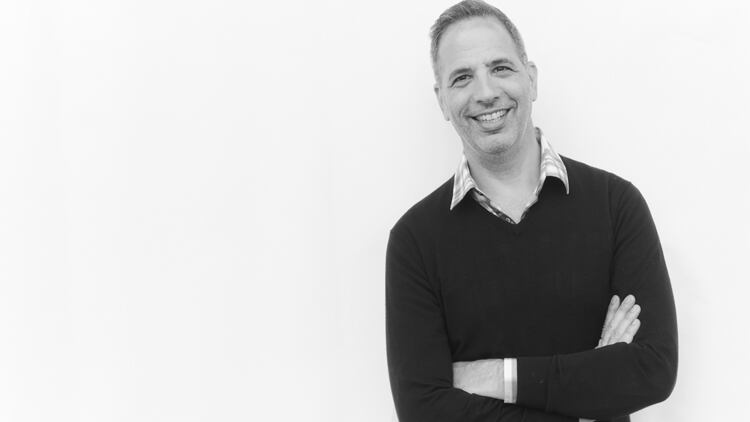The popularity of Israeli-born but now London-based chef Yotam Ottolenghi and his many cookbooks is such that ‘to ottoleng’ has become a verb in many a dinner party-throwing household. While his wider operation – encompassing five delis and the standalone NOPI and ROVI restaurants, a development kitchen, a catering service, and a comprehensive online retail offer – has been highly successful its scale is not commensurate with its founder’s status as one of the world’s bestselling cookbook authors with more than five million sales to his name.
Yet this could soon change. As the group – which was founded by Ottolenghi, Sami Tamimi, Noam Bar and Cornelia Staeubli as a vibrant-yet-unassuming deli in Notting Hill in 2002 – marks two decades in business it has brought in an outsider to oversee the next stage of its growth and better integrate its departments.
The Italian-born Emilio Foa brings with him more than two decades of experience in high-end consumer brands having previously held senior roles at Rapha and Burberry and, most recently, overseen luxury furniture retailer Oka.
"The four founders have run things like a family business for the past 20 years. We have done a good job. We feel we deliver quality in everything we do,” Ottolenghi tells me, having just ducked into a Costa to take my call on route to one of his delis. Though he’s too modest to say it himself, Ottolenghis are bustling places and therefore not an ideal location for a telephone interview.
“But now we want to streamline certain things and make sure the business is a bit more connected and integrated going forwards. That's Emilio's job. To come and look at what we do through fresh eyes.”
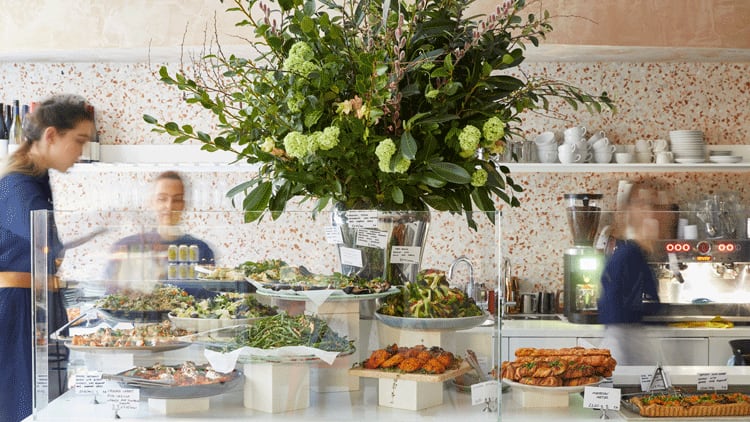
Going global
Foa is in complete agreement that the Ottolenghi brand has been underleveraged. "This is the reason I am here and what I have been discussing with the team since day one. The Ottolenghi brand is far bigger than the Ottolenghi business,” he says when I call him a few days after my chat with the group’s namesake. “We have sold more books in the US and Australia than we have in the UK without having a physical presence there.”
Ottolenghi’s new CEO sees a bricks-and-mortar move into international markets as the biggest and most pressing opportunity for the group. Opening overseas has already been explored several times with the group having been approached by various potential partners including high-end hotel chains and prospective franchisees.
“We’re yet to find a way to do it that would not compromise quality or carry a big personal cost,” says Ottolenghi. “And we have not managed to find someone able to convince us that they are a worthy partner. They need to stand for the same values as we do and understand that it's not about growth for us, but about quality.”
Foa seems more confident about finding a partner than Ottolenghi having been responsible for emerging markets while at Burberry. “International can be big," he says. "The Ottolenghi brand has the potential to go across all continents."
"We don't want to become a chain. We want to be
selective and preserve the brand positioning"
Initially, Foa says the company we look at what it internally calls the hybrid Ottolenghi format - based on its Islington and Spitalfields venues that have a deli and restaurant serving breakfast, lunch and dinner - as the one to expand with internationally
That said, he would not rule out a la carte one-offs like NOPI and ROVI in major international cities. He even goes as far as to suggest that the group may eventually look to build a similar presence to that which it has in London, with a mix of neighbourhood delis, larger more centrally located delis and one-offs.
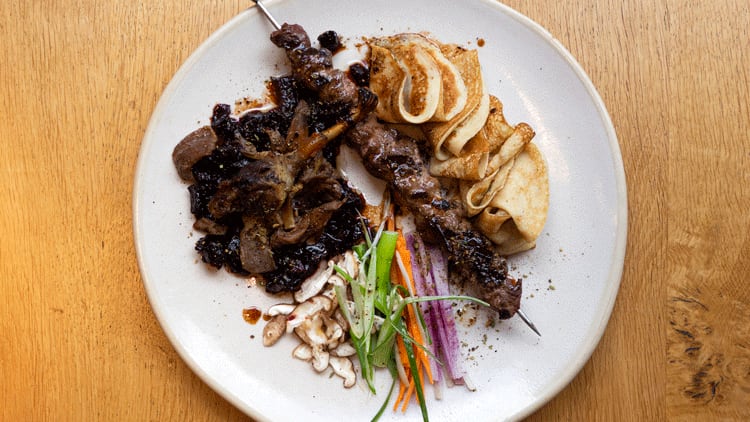
Capital gains
The pair’s expansion plans for London and the UK more widely are more measured. Ottolenghi believes a follow up to Soho’s NOPI and Fitzrovia’s ROVI is unlikely within the next few years because such projects take a disproportionate amount of resources.
Foa, meanwhile, has identified a handful of new neighbourhoods in which he believes Ottolenghi delis would work. “We think we can stretch the presence in London a little further. We don't want to become a chain. We want to be selective and preserve the brand positioning.”
While Foa has no experience of hospitality other than as a customer, he does understand the limitations that restaurants cooking fresh food from scratch have when it comes to rapid expansion. As Ottolenghi himself eloquently puts it: “The core values of this business are quality and innovation. You can’t maintain that if you grow exponentially.”
The group’s new CEO believes there are a lot of commonalties with his previous businesses and Ottolenghi in terms of the overall brand, but fewer in terms of operations.
“In high-end retail the product is designed, developed and produced somewhere else and is to some extent standard. In a restaurant, the magic is being produced on a minute-by-minute basis. It’s like a theatre performance in that sense. For that reason, people are very important. The standards and demands are much higher than in other retail environments.”
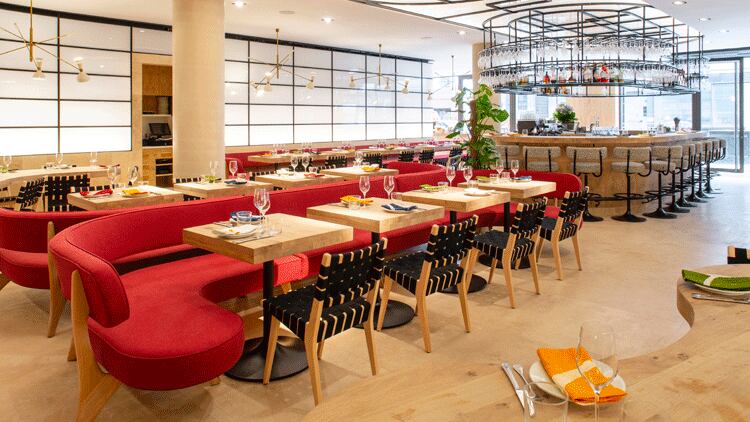
People power
Ottolenghi is proud of his group’s ability to develop and retain its people. “Like everyone else we are now struggling with a higher turnover of staff, but our retention is way above industry averages," he says. "We have a running joke that when people do leave, they often end up coming back. We listen to what our staff need and empower them by giving them real responsibility for their area. We also like to move them around the business.”
"The Ottolenghi brand is far
bigger than the Ottolenghi business"
On that note, there has been much change at the top of the company in recent years (see The people that make Ottolenghi tick). Palestine-born chef Tamimi has left the business on good terms and Bar – whose role was concerned with strategy and finance – is no longer involved in the day-to-day running of the business having stepped away to ‘oversee an exciting new project in the food and drink space'. He will continue to have an input into strategy as non-executive director.
The Swiss-born Staeubli has been a driving force in the business from the early days with a focus on ops and HR – it is to her Ottolenghi attributes the group’s strong staff retention figures - and was recently made managing director.
As the figurehead of the business, Ottolenghi spends time in the restaurants and delis dishing out ‘creative criticism’ but spends most of his time in the group’s Holloway Road Test Kitchen creating recipes for his books, newspaper columns and TV shows.
Such is the scale of the work, he now sees his role as that of a conductor. “Now, we want to empower people to do their own thing. I don’t create all of the recipes by any stretch."
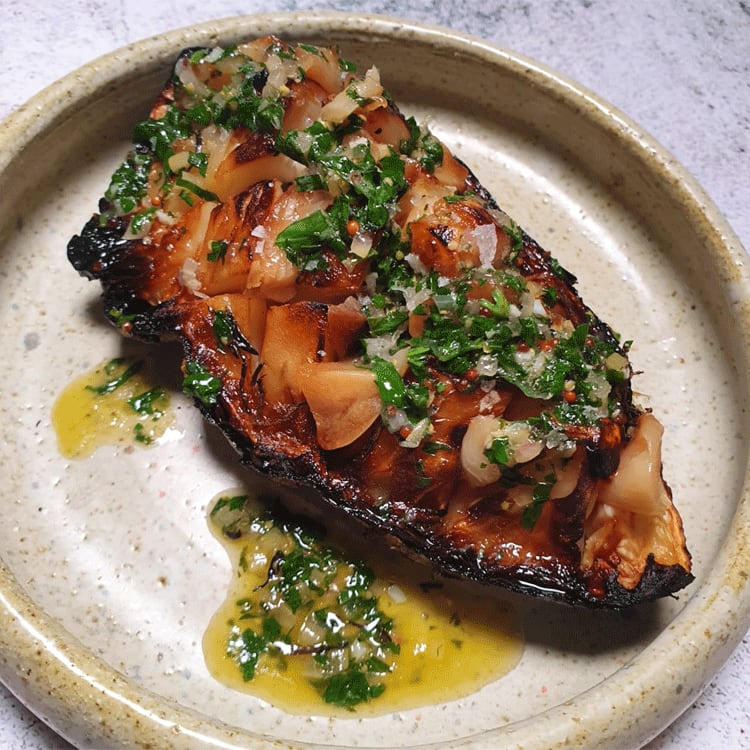
Following the Ottolenghi recipe
Given that Ottolenghi is now only responsible for a fraction of his group's creative output, how exactly is an Ottolenghi recipe defined? While there are no guidelines as such, there are some defining features, he says.
"We celebrate vegetables. We also like an element of surprise and to try and do things a bit differently, for example juxtaposing ingredients, or adding a savoury element to a sweet dish. And our dishes are not that expensive to put on the table. Yes, we use good ingredients, but they are affordable. We rarely use expensive cuts of meat, for example.”
"I don’t like the word exotic because
what’s exotic today won’t
be exotic tomorrow"
Another key element of Ottolenghi’s cuisine is the use of spice. In the early years of the group’s cookbooks and restaurants spices associated with the Middle East were front and centre but the team have now expanded their repertoire. As such, you’re as likely to come across Mexican chillies and Asian ingredients as you are zaatar and sumac.
“We like to continue to introduce people to new, exciting ingredients. I don’t like the word exotic because what’s exotic today won’t be exotic tomorrow. There was a time when tahini was difficult to get hold off but now you can find it in most supermarkets,” says Ottolenghi, modestly ignoring the fact that tahini – and indeed zaatar and sumac – probably would not have made supermarket shelves were it not for his efforts.
The sheer number of recipes the group is now required to produce is surely part of the reason for this all-embracing, globalised approach, but it’s also due to Ottolenghi’s focus on collaboration. A number of the chef’s more recent cookbooks are co-written with people from different culinary backgrounds.
“I suppose that’s another slightly less tangible thing that defines what we do. Noor Murad (who heads up Ottolenghi’s Test Kitchen) put it very well in the intro to one of our books when she said that often Ottolenghi food is about the stories of the people that make it.”

Let them eat veg
Ottolenghi has been putting vegetables centre stage since his early days as a chef but has never had a vegetarian agenda as such. “16 years ago, The Guardian asked me to write a vegetarian column for their Weekend magazine. I did it, but it was strange to me as I don’t see my food as being either vegetarian or non-vegetarian,” says Ottolenghi, who continues to create recipes and pen articles for The Guardian and numerous other publications around the world including The New York Times.
While his recipes for The Guardian are no longer exclusively vegetarian, the majority of them are. “People are now switching to more vegetable-heavy diets. For me it came naturally because Israeli and Middle Eastern cooking more widely has always done it. It felt very natural.”
The focus on vegetables is good news for the restaurant side of the business’s coffers too, at least partly insulating the estate from the hike in input costs the industry has seen over the past year or so. But the group has still had to work hard to keep costs in check, in some cases ditching certain ingredients or using less of them.

Getting through the pandemic
Keeping a close eye on costs, reopening restaurants quickly to sell meals to take away and diversifying its online product range allowed the group to weather the pandemic better than most.
With three of its then six sites closed for the majority of the financial year ending 31 March 2021, turnover dropped by close to £13m to £7.8m. Despite this, the business still managed to post a modest profit and said at the time that it was operating at a higher earnings margin than before the pandemic.
“We’re not looking for short-term funding
that would influence the direction
and pace at which we grow"
“I was amazed by last year's results. Posting a positive EBITDA during this period is incredible and a testament to care with which the group is run. We are in a privileged financial position now as we have no investors or debt,” says Foa, who is confident the business will be able to access the funds it needs to grow when the time is right.
“We’re not looking for short-term funding that would influence the direction and pace at which we grow. Want to a walk the next few stages of the journey on our own.”
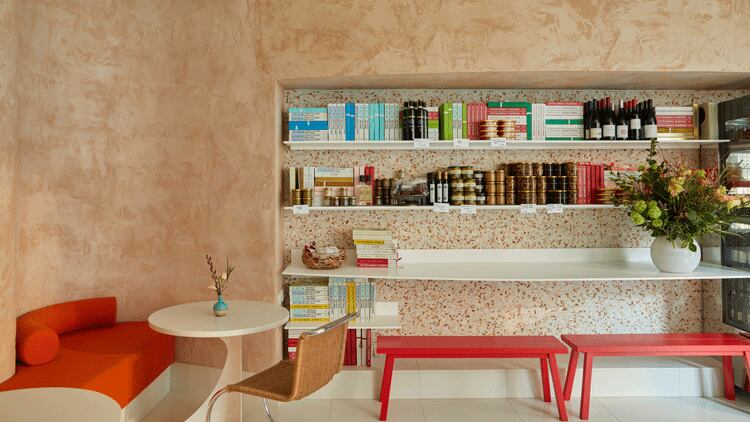
Reviewing Ottolenghi’s content
While the online retail side of the business – which can ship products to pretty much anywhere in the world - is important and will soon broaden its product range, Foa sees more potential in content than retailing reassuringly-expensive condiments (the site’s make your own hummus kit costs an eye-watering £45).
“We create a lot of content across multiple media platforms including books, newspapers, our own website and social media channels,” he says. “There is an opportunity to better integrate those channels and offer an even richer and more engaging user experience to our customers.”
Quite how this will all work hasn’t quite been decided but Foa appears to be considering some sort of central hub that would have a paywall element. "We may look to monetise, but in a mindful manner. We can’t push too much; it must be done in an intelligent and respectful manner. We could easily get a short-term financial win out of monetisation of our content, but in the long-term engagement and reach are just as important.”
The people who make Ottolenghi tick
Yotam Ottolenghi
Born in Jerusalem, Ottolenghi came to cooking relatively late on in life having been conscripted for military service – he spent three years at Israel Defence Forces intelligence headquarters – before completing a bachelors and masters in comparative literature at Tel Aviv university. After a brief spell as a journalist and editor, he moved to London in the late 1990s to study French pastry at Le Cordon Bleu. He worked at a number of top London hotels and restaurants before becoming head pastry chef at Dan Lepard’s influential Baker & Spice group. In 2002, he opened the first Ottolenghi deli, in Notting Hill, with Sami Tamimi and Noam Bar.
Emilio Foa
Like any self-respecting Italian, Ottolenghi’s recently appointed CEO is a lover of good food, but has never worked in hospitality. He has been a customer of Ottolenghi's since he first moved to London 15 years ago. Earlier on in his career he worked for luxury goods companies including Gucci and Burberry but has more recently favoured, smaller entrepreneurial businesses with ambitious growth plans, including cycling lifestyle brand Rapha and luxury furniture brand Oka. "I feel a lot of responsibility because I'm the group's first-ever external chief executive. It's my job to get the brand to where we all want it to be in 25 years' time."
Cornelia Staeubli
Originally from Switzerland, Ottolenghi’s current managing director is billed as a founder but joined the business around a year in when her future mother-in-law spotted a notice in the original Ottolenghi deli’s window advertising for staff. She soon rose to managing director and is now credited as being ‘the one who organises everyone and makes things work’.
Noam Bar
Also from Israel, Noam Bar travelled to London with Ottolenghi and has been with the group from the very start. He is described as having co-led the process of growing Ottolenghi from a small shop in Notting Hill to a ‘globally-recognised market leader in the food and hospitality sectors’. He has now stepped away from the business to pursue a new project in food and drink but remains a non-executive director.


